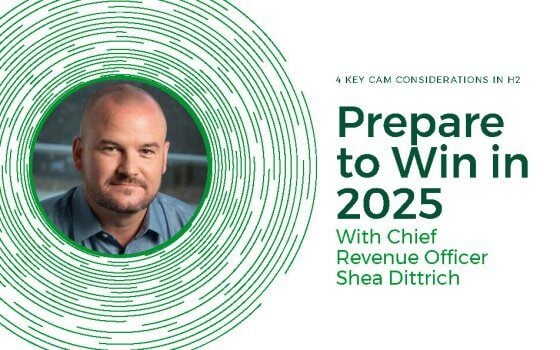As we watch the fight for the first 12 team playoffs in college football come down to the wire, our Chief Revenue Officer Shea Dittrich sees it as a reminder of the rewards awaiting CAM companies if they prepare to win. He’s shared his top trends and advice for the rest of 2024 and going into 2025, as our industry evolves and grows more competitive. Read his LinkedIn article below or click here to connect and join the conversation.
Nick Saban, who is widely considered the greatest college football coach of all time, once said, “Becoming a champion is not an easy process. It is done by focusing on what it takes to get there -- and not on getting there.” This captures the crucial task facing association management companies today, in a rapidly changing and increasingly competitive space.
Not only will management companies need to define what that success looks like for them. They’ll need a sound strategy to go for victory. As we barrel through the end of the year, the college football playoff race is an apt reminder of the rewards that lie ahead with the right preparation. Here’s what CAM companies should consider approaching 2025, starting with what’s on everyone’s mind.
Acquisitions are rising, impacting everyone.
Anyone in our industry can see that a record number of acquisitions are happening. As emerging tech provides more scalable, cost-effective processes and platforms, investors are increasingly attracted to CAM companies. Whether you plan on growing and scaling your company or selling, you’ll need a solid foundation built on reliable data and efficient processes.
If you’re ultimately headed for the exits (and, perhaps, somewhere warm and tropical), EBITDA will be your constant refrain. Have you measured your cost per door, or better yet, benchmarked your costs against industry standards? According to third-party research, the average CINC Systems customer operates at a $1.33 efficiency per door.
When you’re staying in the game, growth and expansion also demand minimizing operating costs. CAM companies looking to scale should also consider adopting new revenue streams and aim for these to exceed 50% of base management fees.
Driving operational efficiency is critical.
Between rising operational costs, manager burnout, and boards demanding lower fees, increasing operational efficiency is a tall order. The good news is that it is very achievable, thanks to recent tech innovations.
The one I’m most excited about is Generative AI for the CAM space. The AI hype is real, and it’s not hyperbole to say GenAI will completely transform our industry and the way management companies serve boards and homeowners. That’s because we’re already seeing it.
After building and launching Cephai, the industry’s first generative AI solution, we’ve already seen some customers reduce homeowner contact volume by as much as 75%. Imagine the short and long-term impacts of automating mundane tasks—from increased client engagement and retention to the broad organizational impacts from sustained cost savings and the ability to explore new revenue streams.
And Cephai for homeowners is just the beginning. Next month, we’re incorporating generative AI into the CINC Manager app, driving even more efficiencies and opportunities.
Increased oversight has introduced more challenges.
Increasing investment in CAM companies will bring more attention—and scrutiny—to the industry. Companies must navigate shifting legislation, including the Corporate Transparency Act, which requires almost all associations to file a beneficial owner report to FinCEN by January 1st. CINC has introduced new software features to help boards streamline filing, stay compliant, and keep sensitive data safe.
Still, any new or evolving HOA/COA legislation is unwelcome news in a climate where CAM companies face no shortage of other hurdles, like rising costs and cyber-attack threats; meanwhile, boards are demanding lower management fees.
Successfully navigating these obstacles requires a proactive approach and a commitment to staying informed and secure. And you don’t have to go it alone.
It’s time to think of CAM as a team sport.
JOIN THE CONVERSATION ON LINKEDIN >






